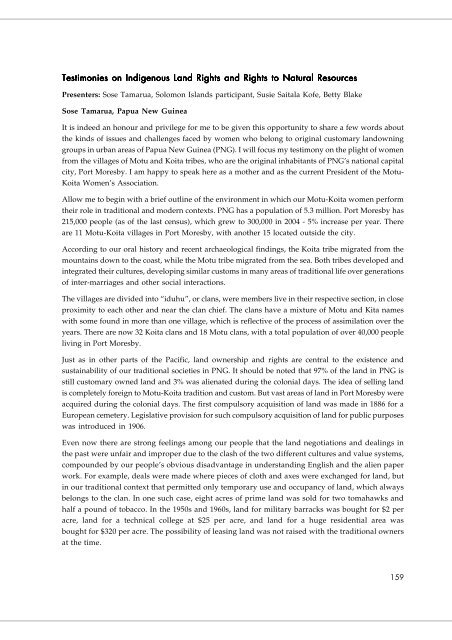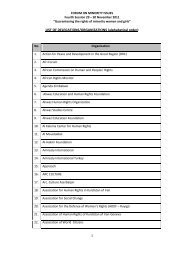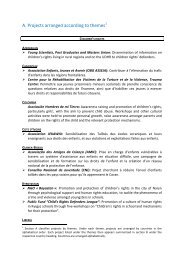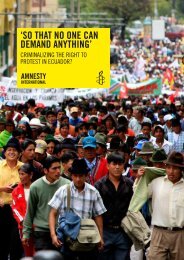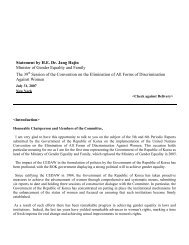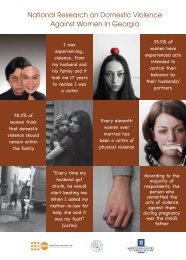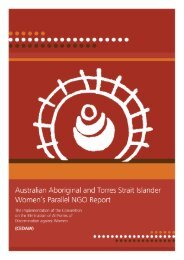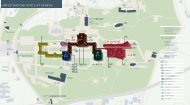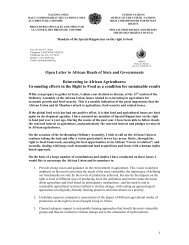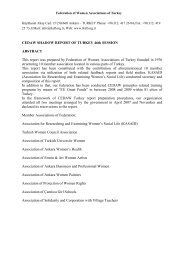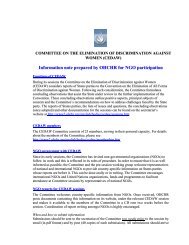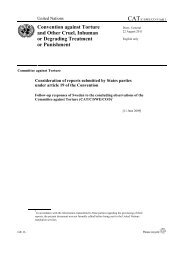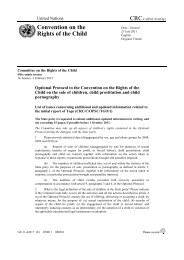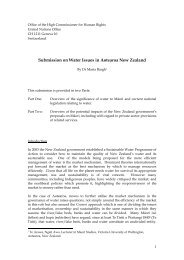Report - Office of the High Commissioner on Human Rights
Report - Office of the High Commissioner on Human Rights
Report - Office of the High Commissioner on Human Rights
- No tags were found...
You also want an ePaper? Increase the reach of your titles
YUMPU automatically turns print PDFs into web optimized ePapers that Google loves.
Testim<strong>on</strong>ies <strong>on</strong> Indigenous Land <strong>Rights</strong> and <strong>Rights</strong> to Natural Resources<br />
Presenters: Sose Tamarua, Solom<strong>on</strong> Islands participant, Susie Saitala K<str<strong>on</strong>g>of</str<strong>on</strong>g>e, Betty Blake<br />
Sose Tamarua, Papua New Guinea<br />
It is indeed an h<strong>on</strong>our and privilege for me to be given this opportunity to share a few words about<br />
<str<strong>on</strong>g>the</str<strong>on</strong>g> kinds <str<strong>on</strong>g>of</str<strong>on</strong>g> issues and challenges faced by women who bel<strong>on</strong>g to original customary landowning<br />
groups in urban areas <str<strong>on</strong>g>of</str<strong>on</strong>g> Papua New Guinea (PNG). I will focus my testim<strong>on</strong>y <strong>on</strong> <str<strong>on</strong>g>the</str<strong>on</strong>g> plight <str<strong>on</strong>g>of</str<strong>on</strong>g> women<br />
from <str<strong>on</strong>g>the</str<strong>on</strong>g> villages <str<strong>on</strong>g>of</str<strong>on</strong>g> Motu and Koita tribes, who are <str<strong>on</strong>g>the</str<strong>on</strong>g> original inhabitants <str<strong>on</strong>g>of</str<strong>on</strong>g> PNG’s nati<strong>on</strong>al capital<br />
city, Port Moresby. I am happy to speak here as a mo<str<strong>on</strong>g>the</str<strong>on</strong>g>r and as <str<strong>on</strong>g>the</str<strong>on</strong>g> current President <str<strong>on</strong>g>of</str<strong>on</strong>g> <str<strong>on</strong>g>the</str<strong>on</strong>g> Motu-<br />
Koita Women’s Associati<strong>on</strong>.<br />
Allow me to begin with a brief outline <str<strong>on</strong>g>of</str<strong>on</strong>g> <str<strong>on</strong>g>the</str<strong>on</strong>g> envir<strong>on</strong>ment in which our Motu-Koita women perform<br />
<str<strong>on</strong>g>the</str<strong>on</strong>g>ir role in traditi<strong>on</strong>al and modern c<strong>on</strong>texts. PNG has a populati<strong>on</strong> <str<strong>on</strong>g>of</str<strong>on</strong>g> 5.3 milli<strong>on</strong>. Port Moresby has<br />
215,000 people (as <str<strong>on</strong>g>of</str<strong>on</strong>g> <str<strong>on</strong>g>the</str<strong>on</strong>g> last census), which grew to 300,000 in 2004 - 5% increase per year. There<br />
are 11 Motu-Koita villages in Port Moresby, with ano<str<strong>on</strong>g>the</str<strong>on</strong>g>r 15 located outside <str<strong>on</strong>g>the</str<strong>on</strong>g> city.<br />
According to our oral history and recent archaeological findings, <str<strong>on</strong>g>the</str<strong>on</strong>g> Koita tribe migrated from <str<strong>on</strong>g>the</str<strong>on</strong>g><br />
mountains down to <str<strong>on</strong>g>the</str<strong>on</strong>g> coast, while <str<strong>on</strong>g>the</str<strong>on</strong>g> Motu tribe migrated from <str<strong>on</strong>g>the</str<strong>on</strong>g> sea. Both tribes developed and<br />
integrated <str<strong>on</strong>g>the</str<strong>on</strong>g>ir cultures, developing similar customs in many areas <str<strong>on</strong>g>of</str<strong>on</strong>g> traditi<strong>on</strong>al life over generati<strong>on</strong>s<br />
<str<strong>on</strong>g>of</str<strong>on</strong>g> inter-marriages and o<str<strong>on</strong>g>the</str<strong>on</strong>g>r social interacti<strong>on</strong>s.<br />
The villages are divided into “iduhu”, or clans, were members live in <str<strong>on</strong>g>the</str<strong>on</strong>g>ir respective secti<strong>on</strong>, in close<br />
proximity to each o<str<strong>on</strong>g>the</str<strong>on</strong>g>r and near <str<strong>on</strong>g>the</str<strong>on</strong>g> clan chief. The clans have a mixture <str<strong>on</strong>g>of</str<strong>on</strong>g> Motu and Kita names<br />
with some found in more than <strong>on</strong>e village, which is reflective <str<strong>on</strong>g>of</str<strong>on</strong>g> <str<strong>on</strong>g>the</str<strong>on</strong>g> process <str<strong>on</strong>g>of</str<strong>on</strong>g> assimilati<strong>on</strong> over <str<strong>on</strong>g>the</str<strong>on</strong>g><br />
years. There are now 32 Koita clans and 18 Motu clans, with a total populati<strong>on</strong> <str<strong>on</strong>g>of</str<strong>on</strong>g> over 40,000 people<br />
living in Port Moresby.<br />
Just as in o<str<strong>on</strong>g>the</str<strong>on</strong>g>r parts <str<strong>on</strong>g>of</str<strong>on</strong>g> <str<strong>on</strong>g>the</str<strong>on</strong>g> Pacific, land ownership and rights are central to <str<strong>on</strong>g>the</str<strong>on</strong>g> existence and<br />
sustainability <str<strong>on</strong>g>of</str<strong>on</strong>g> our traditi<strong>on</strong>al societies in PNG. It should be noted that 97% <str<strong>on</strong>g>of</str<strong>on</strong>g> <str<strong>on</strong>g>the</str<strong>on</strong>g> land in PNG is<br />
still customary owned land and 3% was alienated during <str<strong>on</strong>g>the</str<strong>on</strong>g> col<strong>on</strong>ial days. The idea <str<strong>on</strong>g>of</str<strong>on</strong>g> selling land<br />
is completely foreign to Motu-Koita traditi<strong>on</strong> and custom. But vast areas <str<strong>on</strong>g>of</str<strong>on</strong>g> land in Port Moresby were<br />
acquired during <str<strong>on</strong>g>the</str<strong>on</strong>g> col<strong>on</strong>ial days. The first compulsory acquisiti<strong>on</strong> <str<strong>on</strong>g>of</str<strong>on</strong>g> land was made in 1886 for a<br />
European cemetery. Legislative provisi<strong>on</strong> for such compulsory acquisiti<strong>on</strong> <str<strong>on</strong>g>of</str<strong>on</strong>g> land for public purposes<br />
was introduced in 1906.<br />
Even now <str<strong>on</strong>g>the</str<strong>on</strong>g>re are str<strong>on</strong>g feelings am<strong>on</strong>g our people that <str<strong>on</strong>g>the</str<strong>on</strong>g> land negotiati<strong>on</strong>s and dealings in<br />
<str<strong>on</strong>g>the</str<strong>on</strong>g> past were unfair and improper due to <str<strong>on</strong>g>the</str<strong>on</strong>g> clash <str<strong>on</strong>g>of</str<strong>on</strong>g> <str<strong>on</strong>g>the</str<strong>on</strong>g> two different cultures and value systems,<br />
compounded by our people’s obvious disadvantage in understanding English and <str<strong>on</strong>g>the</str<strong>on</strong>g> alien paper<br />
work. For example, deals were made where pieces <str<strong>on</strong>g>of</str<strong>on</strong>g> cloth and axes were exchanged for land, but<br />
in our traditi<strong>on</strong>al c<strong>on</strong>text that permitted <strong>on</strong>ly temporary use and occupancy <str<strong>on</strong>g>of</str<strong>on</strong>g> land, which always<br />
bel<strong>on</strong>gs to <str<strong>on</strong>g>the</str<strong>on</strong>g> clan. In <strong>on</strong>e such case, eight acres <str<strong>on</strong>g>of</str<strong>on</strong>g> prime land was sold for two tomahawks and<br />
half a pound <str<strong>on</strong>g>of</str<strong>on</strong>g> tobacco. In <str<strong>on</strong>g>the</str<strong>on</strong>g> 1950s and 1960s, land for military barracks was bought for $2 per<br />
acre, land for a technical college at $25 per acre, and land for a huge residential area was<br />
bought for $320 per acre. The possibility <str<strong>on</strong>g>of</str<strong>on</strong>g> leasing land was not raised with <str<strong>on</strong>g>the</str<strong>on</strong>g> traditi<strong>on</strong>al owners<br />
at <str<strong>on</strong>g>the</str<strong>on</strong>g> time.<br />
EXECUTIVE SUMMARY 159


